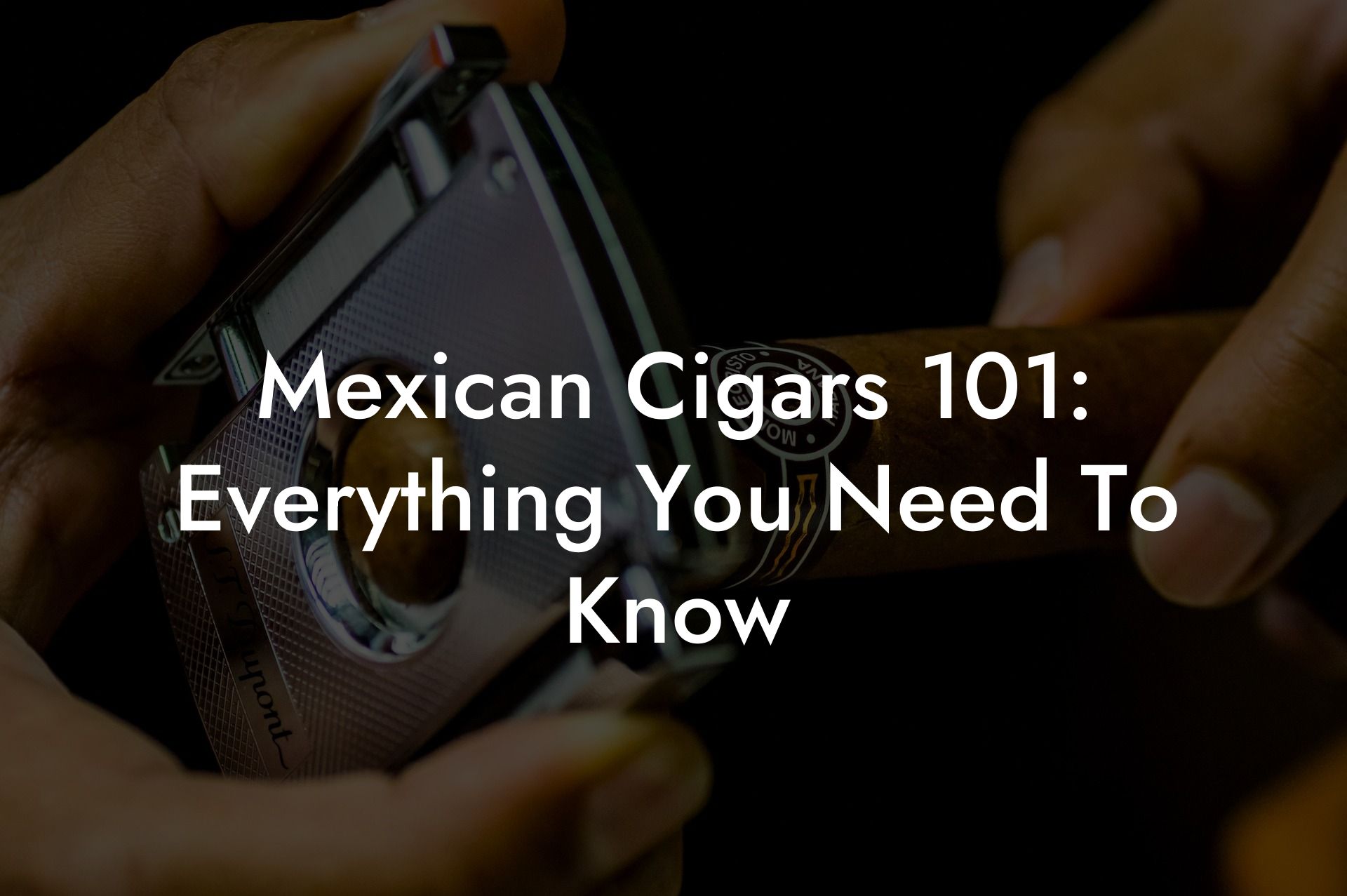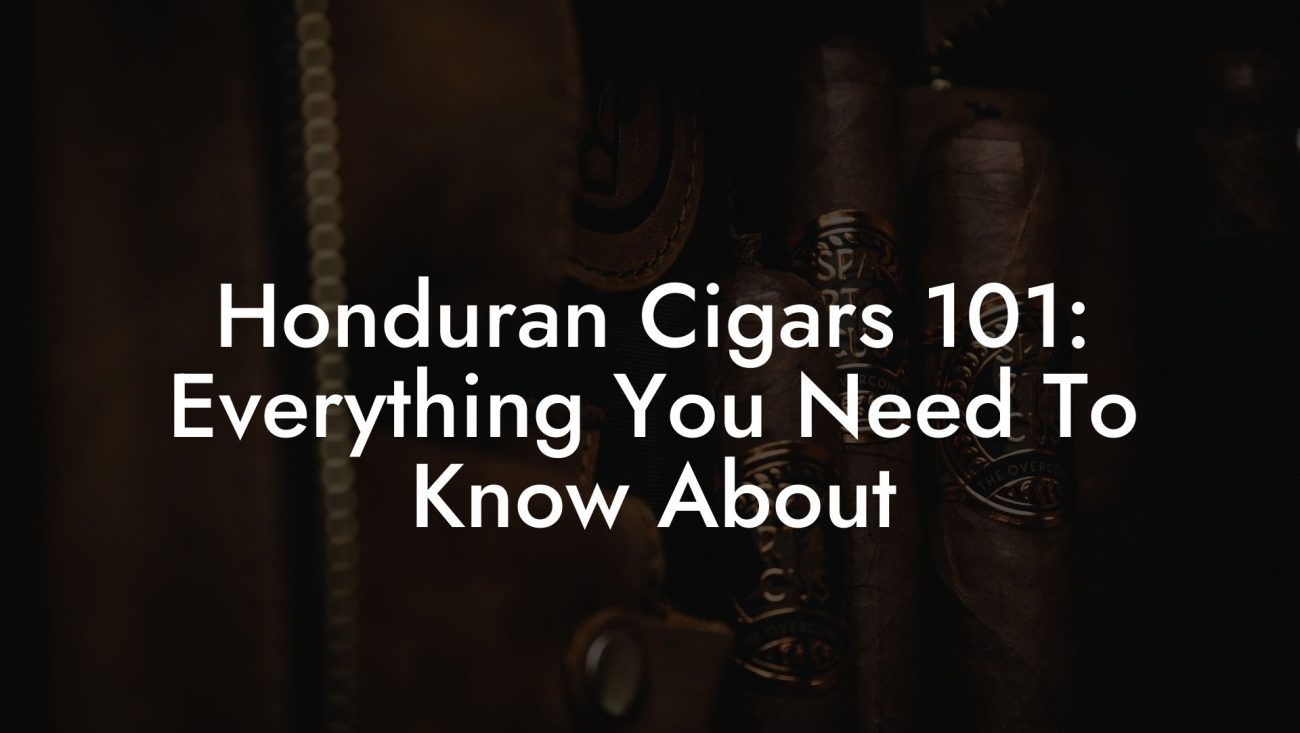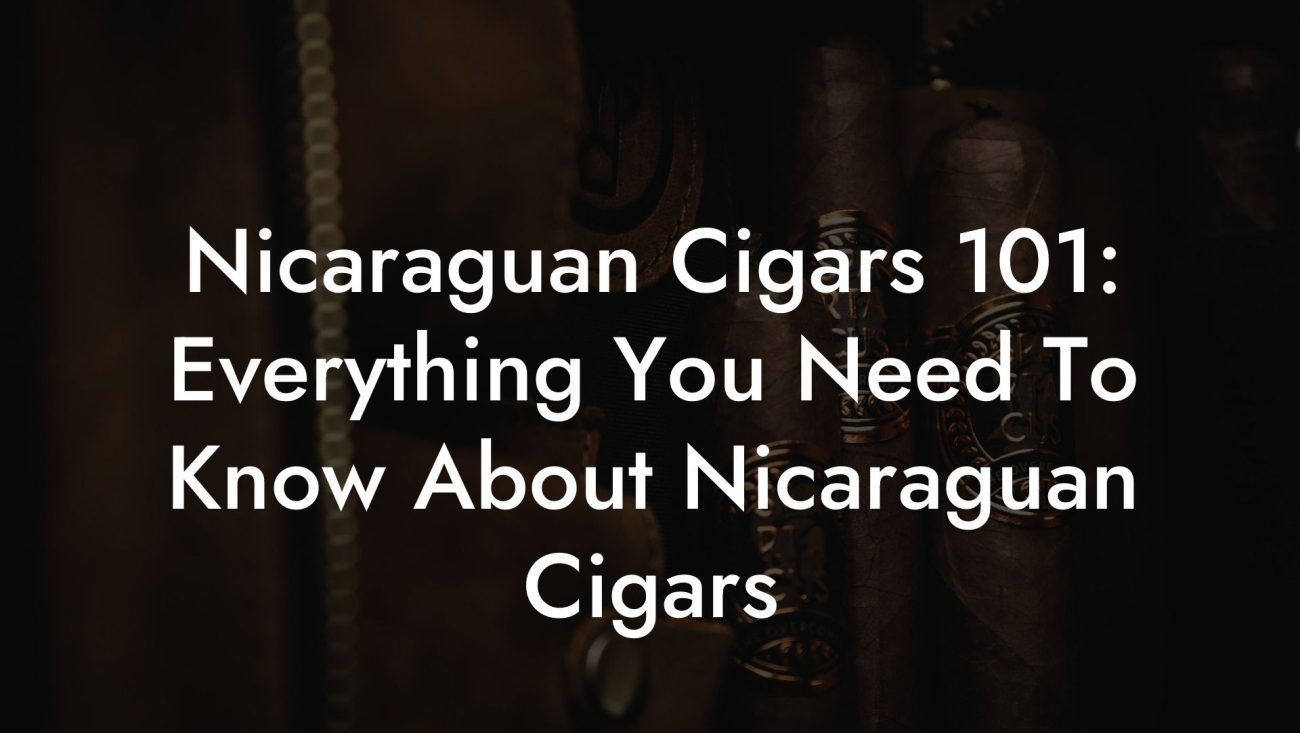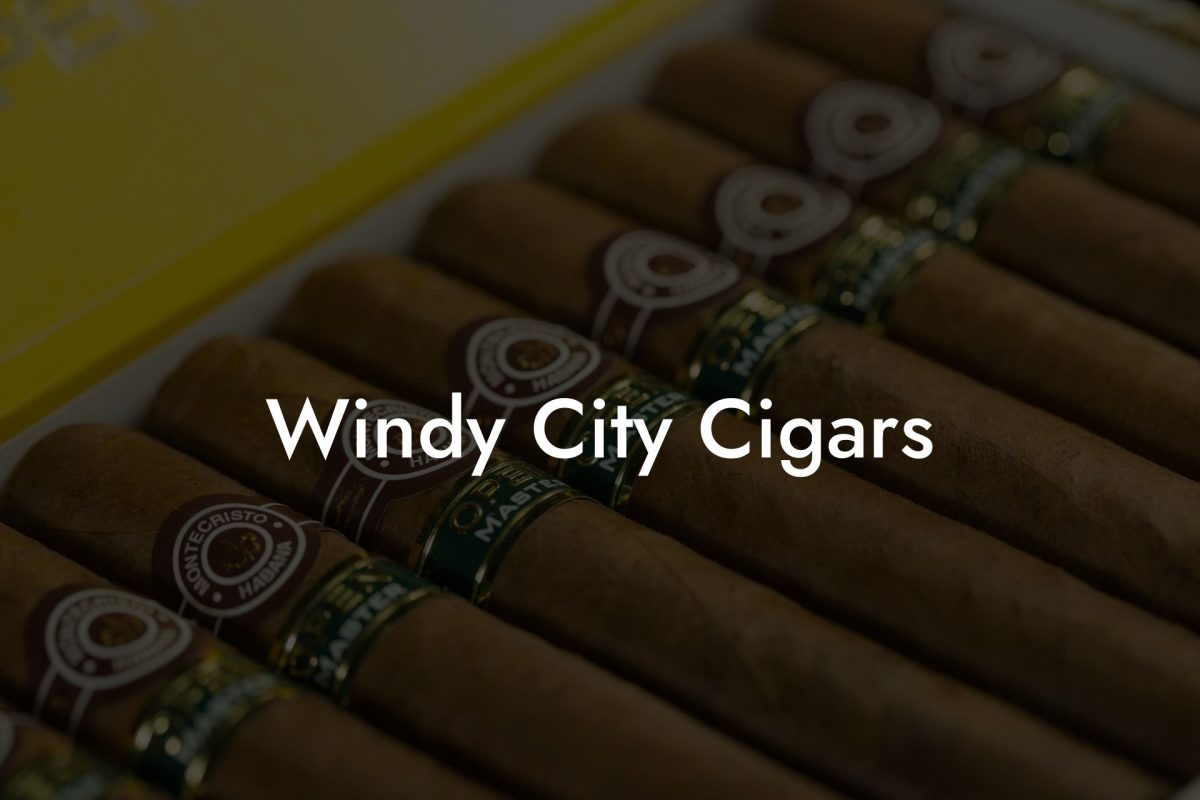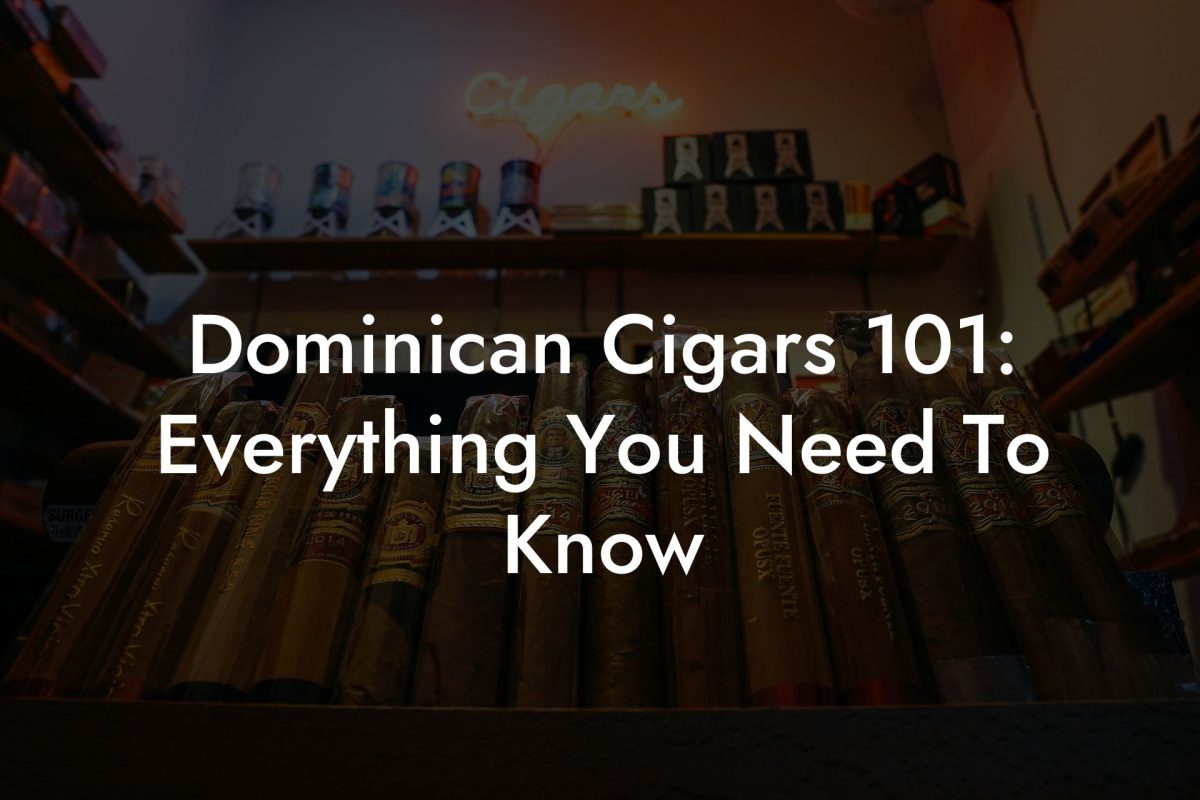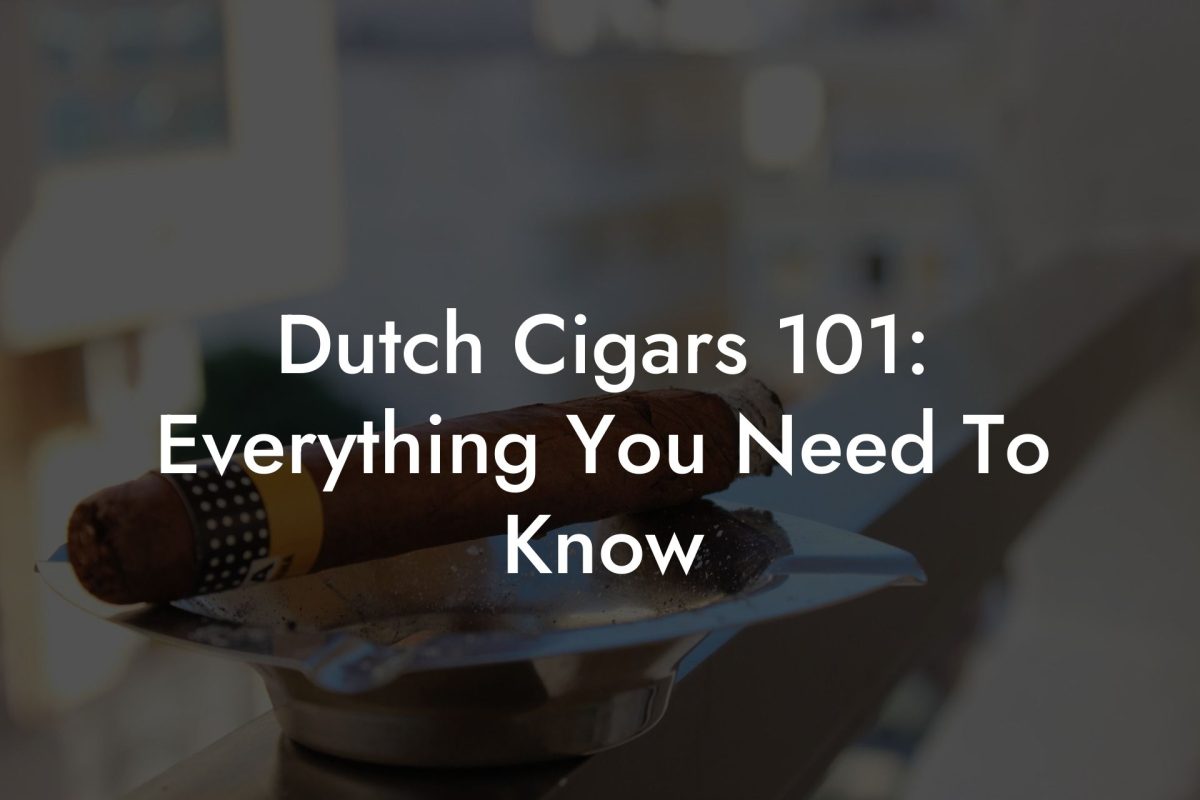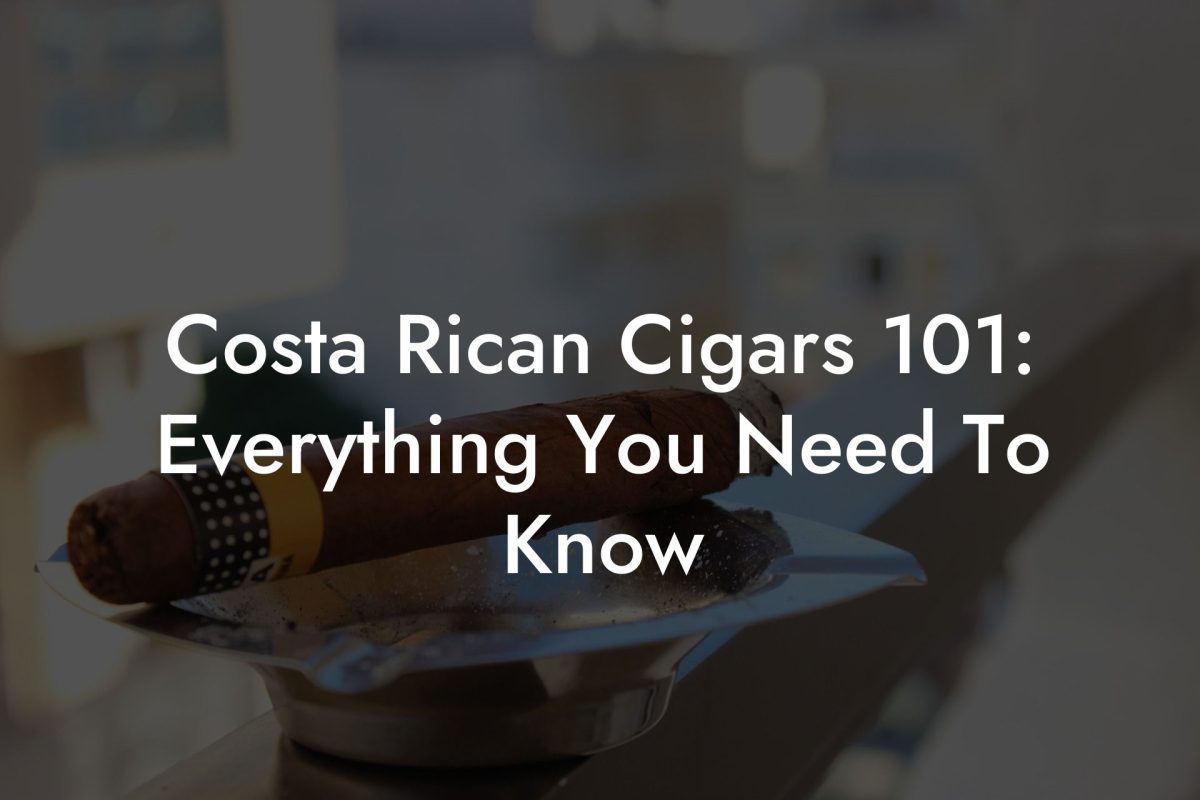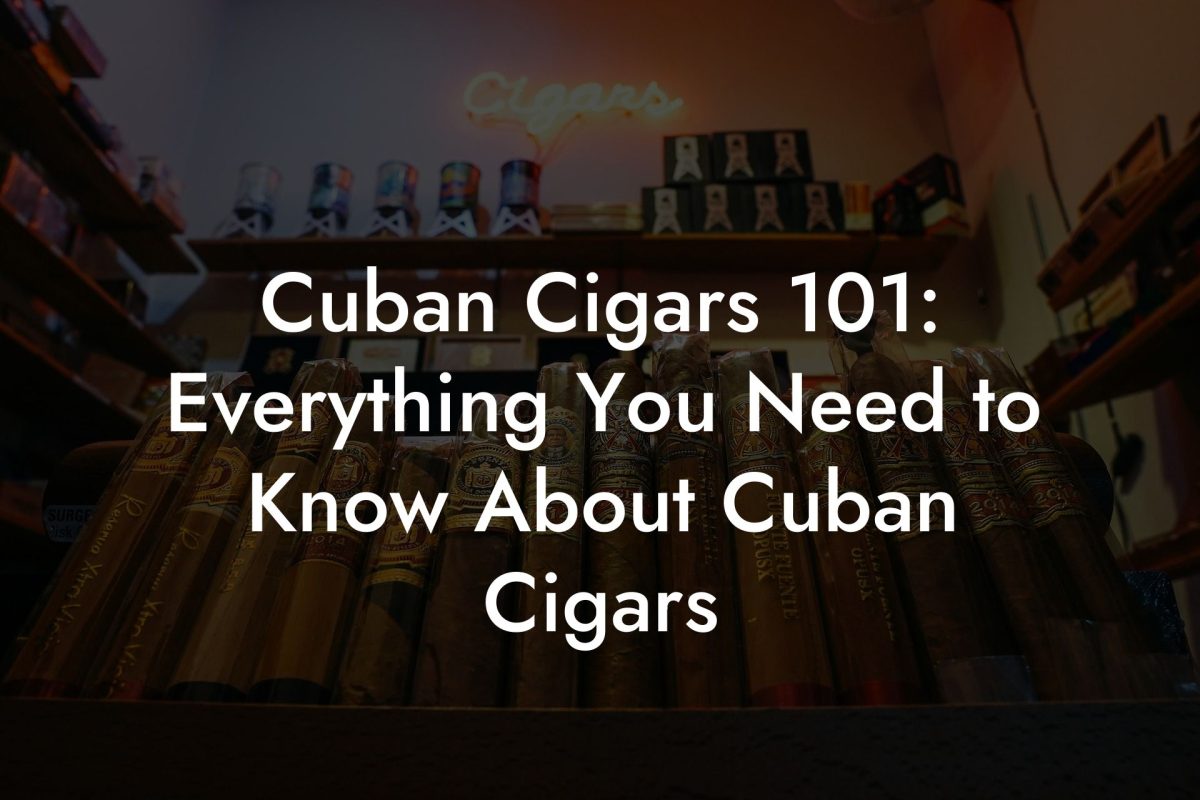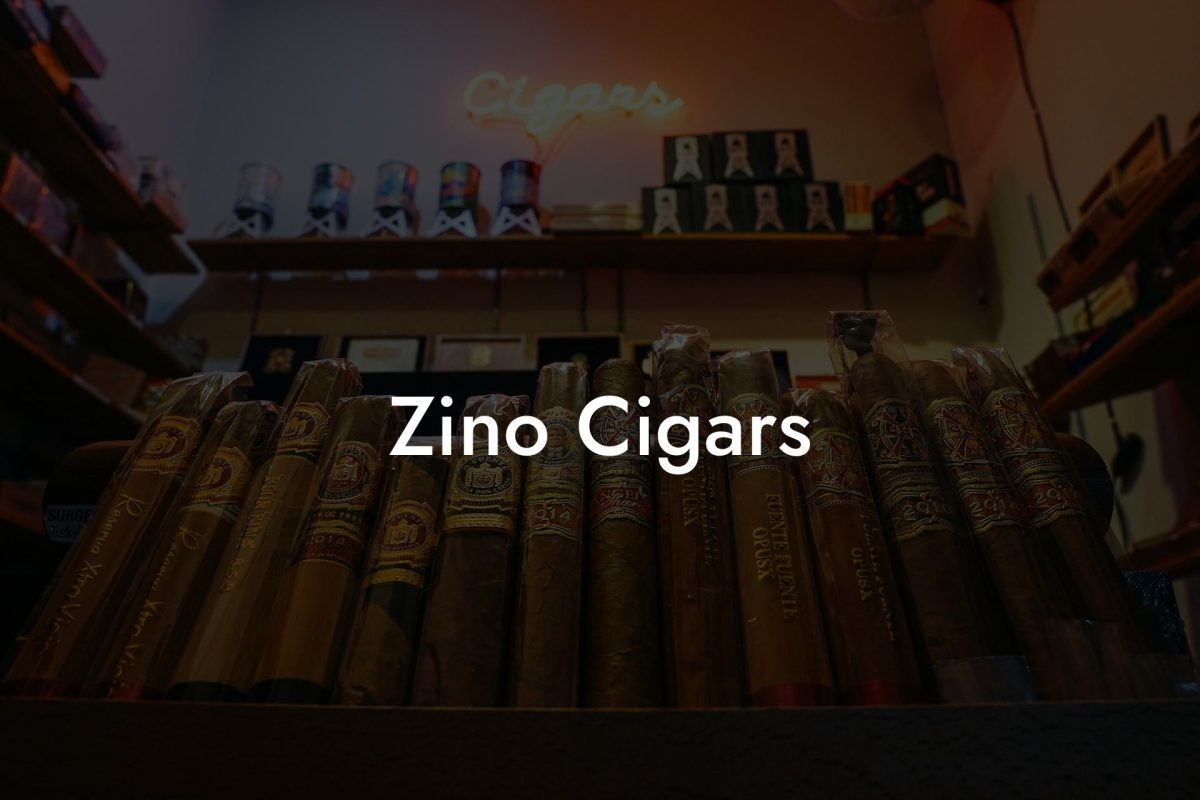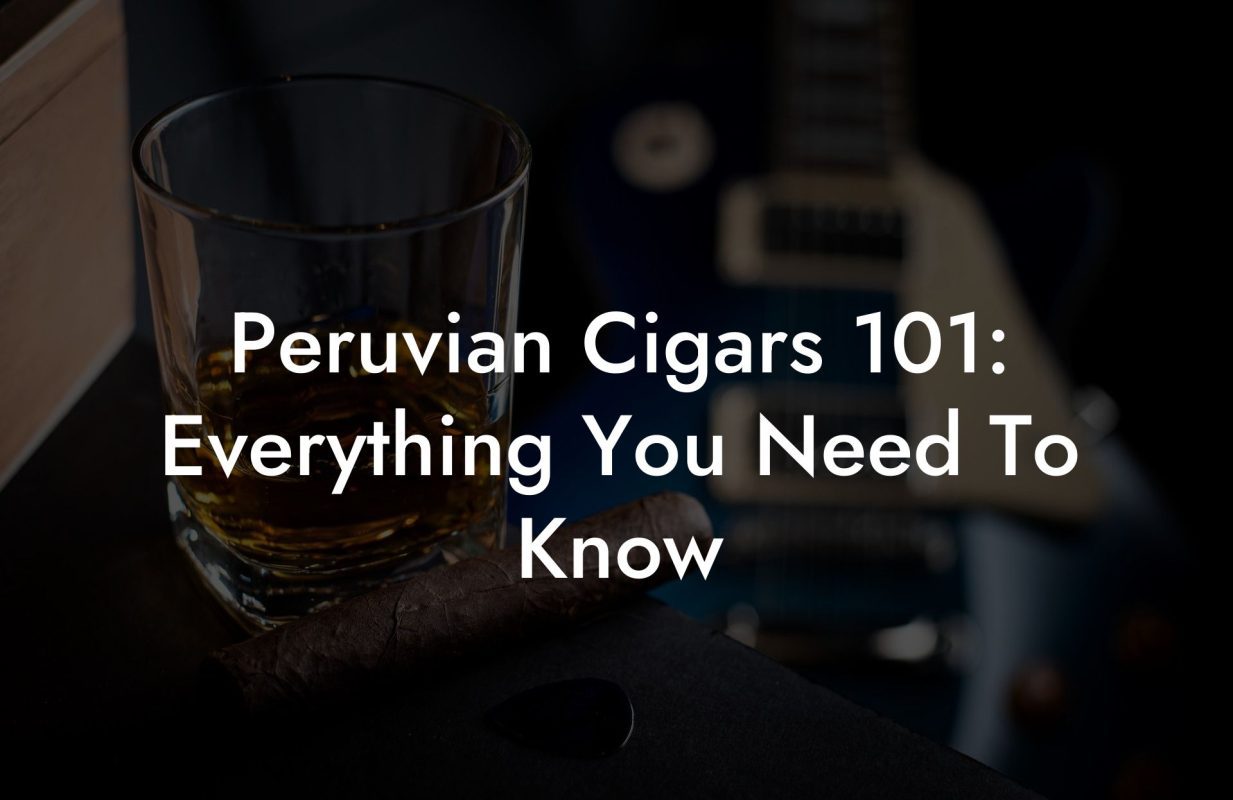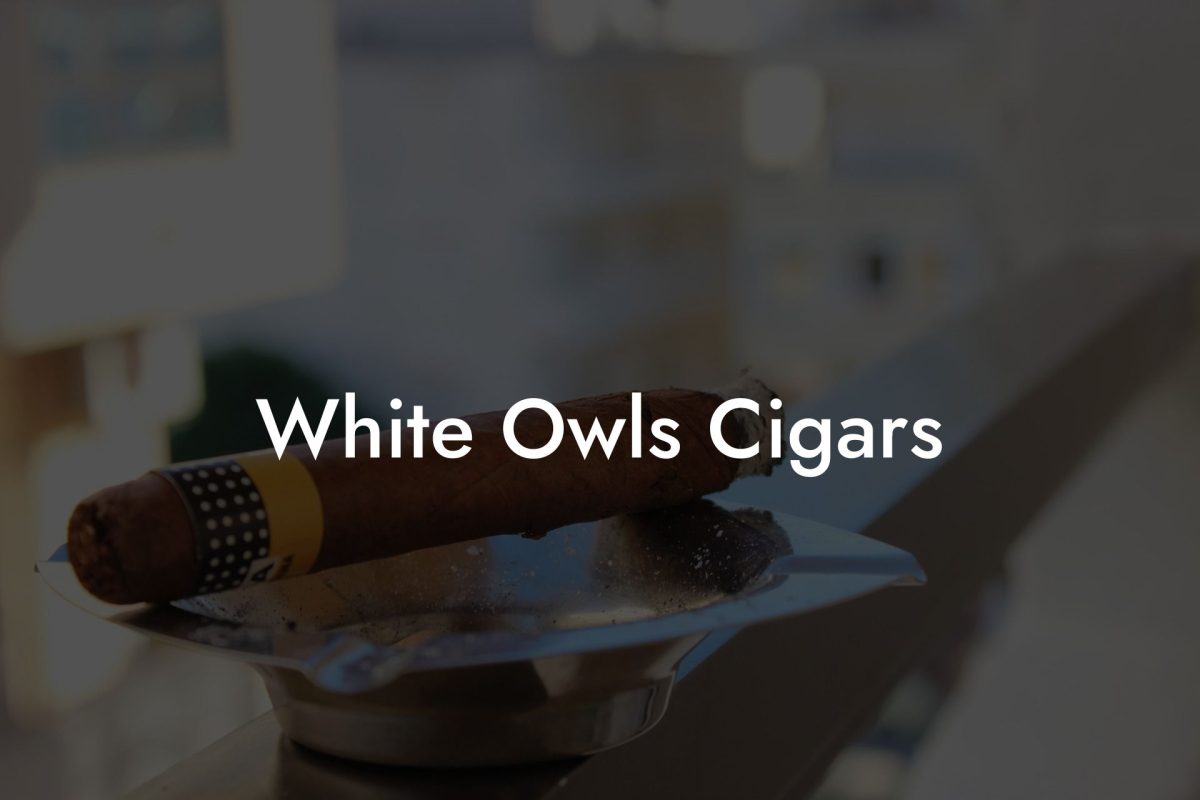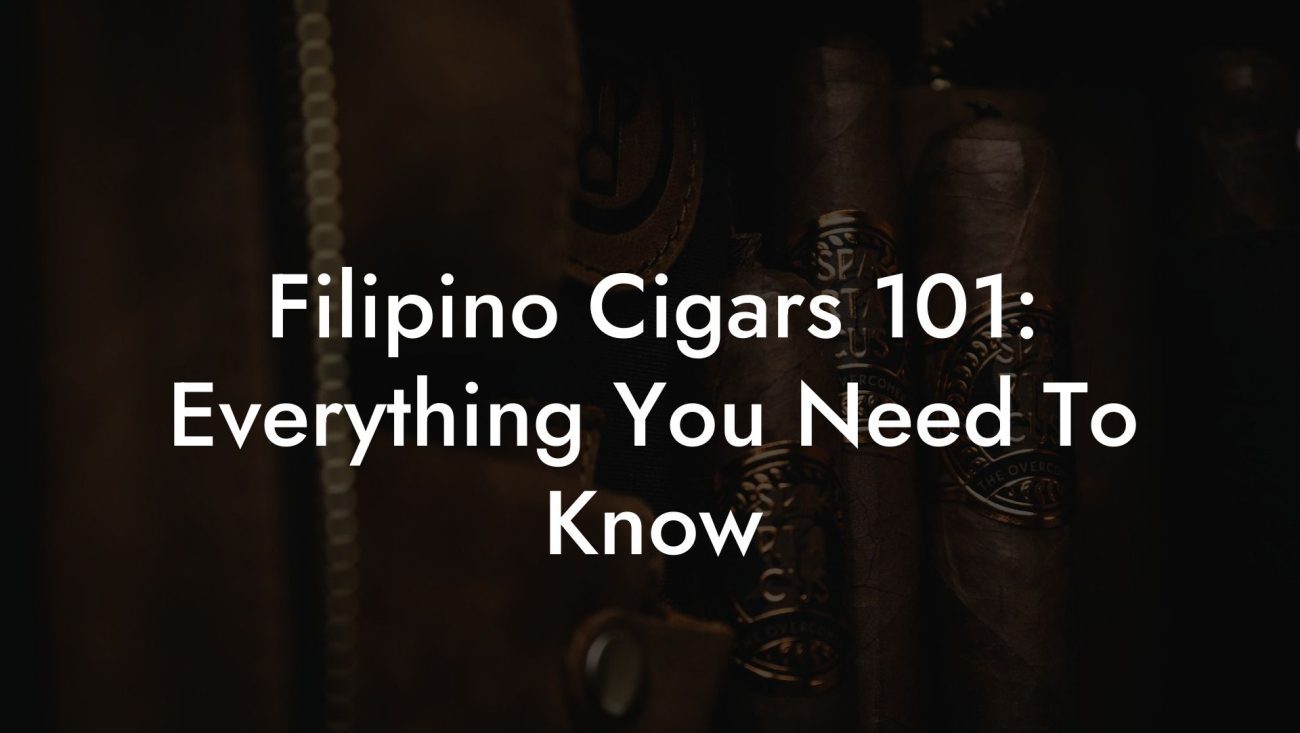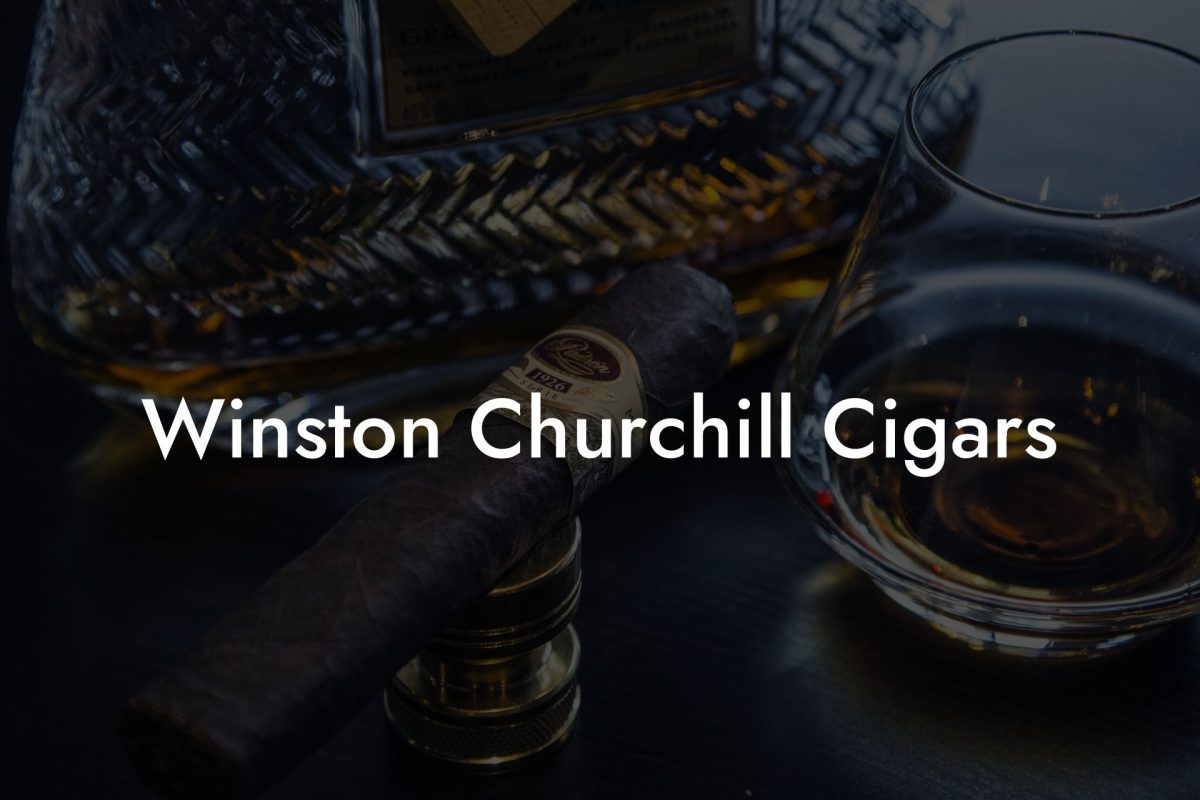There’s something undeniably magnetic about a finely rolled Mexican cigar – a little piece of art that’s equal parts tradition, passion, and a hint of rebel spirit. Whether you're a seasoned aficionado or just vibing with the idea of a leisurely smoke session while vibing to your favorite playlist, Mexican Cigars 101 is here to break it all down in an engaging, witty, and downright fun way. Let’s light up the conversation and take a deep dive into everything Mexican cigars have to offer.
Mexican Cigars 101: Everything You Need To Know Table of Contents
What Exactly Are Mexican Cigars?
A Peek into the Rich History of Mexican cigars
The Craftsmanship Behind Mexican Cigars
Choosing the Perfect Mexican Cigar for Your Vibe
How to Enjoy Your Mexican Cigar Like a Pro
Pairing Mexican Cigars with the Perfect Companions
Debunking Myths: Mexican Cigars Under the Microscope
Mexican Cigars in Contemporary Culture: A Trend for the Modern Age
Resources and Community Support: Your Next Steps
Stepping into the World of Mexican Cigars: A Roadmap
What Exactly Are Mexican Cigars?
Mexican cigars are more than just a smoke – they’re a cultural expression, a nod to rich history, and a testament to the artisanal craftsmanship that has been perfected over generations. Unlike their Cuban or Dominican counterparts, Mexican cigars boast unique characteristics that set them apart. They are crafted using locally grown tobacco, a flair of traditional techniques, and a passion that’s as bold as the flavors they deliver.
Rooted in a deep-seated tobacco heritage, these cigars tap into Mexico’s vibrant history and its diverse regional influences. Whether you’re indulging in a mild, coffee-infused light smoke or a robust, full-bodied experience, every puff is a journey into a world where tradition meets innovation.
For many Gen Z and millennials, Mexican cigars offer more than just a relaxing pastime – they represent a lifestyle, a trend, and an escape from the everyday. Coupled with visually striking packaging and anecdotes that are as colorful as Mexico itself, these cigars are becoming a surprising new favorite for those exploring modern luxury with a twist.
A Peek into the Rich History of Mexican cigars
The story of Mexican cigars isn’t confined to dusty history books or smoke-filled lounges of the past – it’s an ever-evolving narrative that captures a spirit of resilience, creativity, and cultural pride. Tobacco has been cultivated in Mexico for centuries, originally used by indigenous peoples for ritualistic ceremonies and everyday leisure. The art of cigar making was honed over generations, passed down from grandmasters to their eager protégés.
During the colonial era, Spanish influences merged with indigenous techniques, giving rise to distinctive blends that reflected a unique fusion of cultures. In more recent decades, Mexican cigars have seen a renaissance, reinvigorated by a younger generation keen on embracing heritage with a modern twist. Today, you’ll find boutique rollers crafting limited-edition cigars that blend tradition with experimental notes, offering everything from spicy, earthy undertones to hints of chocolate, coffee, and even a whisper of tequila.
This compelling blend of history and innovation is exactly what makes Mexican cigars resonate with modern cigar enthusiasts. They’re not just a smoke – they’re an experience that pays homage to the past while keeping a keen eye on contemporary tastes.
The Craftsmanship Behind Mexican Cigars
Every Mexican cigar is a masterpiece carefully handcrafted by artisans who have perfected the art of tobacco cultivation and rolling. This section takes you behind the scenes of a process that is as intricate as it is fascinating.
From Field to Wrapper: The Tobacco Journey
It all begins in the sun-soaked fields of Mexico, where tobacco leaves are nurtured under optimal conditions. The geographical diversity of Mexico offers a variety of microclimates, each contributing a unique set of flavors and aromas to the tobacco. Local farmers, who often work on family-owned estates, use sustainable and time-honored agricultural practices that have been passed down for generations.
Once the tobacco plants reach their prime, the leaves are carefully harvested and then cured. The curing process is the secret sauce to achieving the perfect balance of moisture and flavor – a step that transforms raw tobacco into the aromatic foundation of a quality cigar.
Rolling with Passion and Precision
After curing, artisans meticulously sort, ferment, and prepare the leaves. Then comes the art of rolling. Skilled torcedores (cigar rollers) shape each cigar with precision, ensuring that every roll meets strict quality standards. This is where tradition and technique intersect – every twist, every fold, and every cut is executed with the utmost attention to detail.
Unlike mass-produced cigars, each Mexican cigar carries with it subtle nuances reflecting the individual artisan’s technique, making every piece a little unique. It’s this personalized touch that appeals to an audience looking for authenticity over automation, blending the old with the new in perfect harmony.
Signature Blends and Flavor Profiles
Mexican cigars are known for their rich and diverse flavor profiles. They aren’t your one-size-fits-all smokes; expect to sample a spectrum from smooth and mellow to bold and spicy. Common tasting notes include hints of cocoa, vanilla, earthy undertones, and even a surprising splash of herbal zest that mirrors Mexico’s vibrant culinary scene. Whether you’re a beginner or a connoisseur, there’s a Mexican cigar flavor profile just waiting for you to explore.
Choosing the Perfect Mexican Cigar for Your Vibe
With an ever-growing assortment of options, how do you find that perfect Mexican cigar that aligns with your style and mood? It all starts with knowing your own vibe. Are you after a laid-back session to unwind after a hectic day, or do you crave a bold statement piece for a night out with friends? Mexican cigars come in a range of sizes, shapes, and flavors – each carefully designed to create a tailored experience.
Shape and Size Matter: From the classic robusto to the elegant toro, the size and shape of a cigar can influence the smoking experience. Smaller cigars tend to offer a quicker, more intense session, while larger ones allow for a long, lingering conversation with your senses.
Flavor Profiles: Do you lean towards something on the lighter side, perhaps with delicate floral or citrus hints? Or is your palate tuned to bolder, spicier flavors that deliver a punch with every draw? Many modern cigar brands offer comprehensive tasting notes on their packaging, making it easier for you to narrow down your choices.
Occasion and Lifestyle: Your choice might also depend on the setting – a solo chill session might call for a different cigar than one chosen for a lively get-together. For the modern smoker, flexibility is key. Many young enthusiasts are embracing Mexican cigars not solely for their taste but for the lifestyle and social aspects they bring along. It’s about creating moments that are as memorable as they are flavorful.
How to Enjoy Your Mexican Cigar Like a Pro
Let’s be honest – enjoying a cigar is about more than just lighting it up. It’s an art form, an experience that engages all five senses and invites you to slow down, savor, and truly live in the moment.
Finding Your Perfect Smoking Spot
Whether it’s a chic rooftop with an urban backdrop or a cozy corner of your living room that feels like your personal retreat, the ambiance sets the tone for your smoking session. Create a space that is comfortable and free from distractions – think soft lighting, a comfortable chair, and maybe even a killer soundtrack.
storage and Humidity Control
To ensure your Mexican cigars maintain their flavor and integrity, proper storage is key. Investing in a quality humidor (or even a stylish DIY setup) will keep your cigars at the ideal humidity levels, preventing them from drying out or becoming too moist. A well-kept cigar is a happy cigar – and a happy cigar makes for a perfect smoke.
Lighting Up the Right Way
Forget the quick-fire lighter moments of yore. The ritual of lighting your cigar should be as satisfying as the smoke itself. Use a wooden match or a soft flame to gently toast the foot of the cigar, ensuring an even burn from the get-go. This careful approach sets the stage for a smooth and consistent flavor profile throughout your experience.
Smoking Etiquette and Mindful Enjoyment
Smoking a cigar is a slow, deliberate act – a moment to relax and savor every draw. Avoid inhaling; instead, focus on experiencing the aroma, flavor, and texture of every puff. Pause, reflect, and engage in light conversation if you’re in a social setting. It’s all about balance, mindfulness, and enjoying the ritual without any rush.
Pairing Mexican Cigars with the Perfect Companions
Just as your favorite playlist can elevate a chill sesh, the right pairing with your Mexican cigar can take the experience to epic new heights. The key is to find complementary flavors that emphasize the unique notes of your cigar.
Cocktails and Spirits
Whether you're into a well-crafted margarita, a smooth whiskey, or something as experimental as tequila-infused cocktails, pairing your cigar with a drink creates a dynamic duo of taste sensations. The spicy and robust profiles of some Mexican cigars pair amazingly well with darker liquors, while lighter cigars might shine alongside crisp, refreshing drinks.
Culinary Delights
For those who love to combine food and leisure, think beyond the traditional cigar bar fare. Consider pairing your smoke with gourmet appetizers, artisanal cheeses, or even a bold Mexican dish – like tacos with a smoky chipotle twist – to create a full sensory indulgence.
The art of pairing is all about experimentation. Don’t be afraid to mix and match to discover your own signature combination that transforms a simple smoke into a culinary celebration.
Debunking Myths: Mexican Cigars Under the Microscope
With any cultural phenomenon comes a fair share of myths and misunderstandings. Let’s set the record straight on some of the most common misconceptions about Mexican cigars.
Myth #1: Mexican Cigars Are Just Imitations
Contrary to popular belief, Mexican cigars stand toe-to-toe with the finest offerings from around the world. Their unique blend of traditional techniques and indigenous flavors makes them a distinct experience – not a mere imitation of Cuban or Dominican varieties.
Myth #2: They’re Only for the Old Guard
Gone are the days when cigars were synonymous with stuffy gentlemen in leather chairs. Today’s cigar culture is inclusive, vibrant, and surprisingly appealing to young adults. With innovative designs, modern branding, and engaging experiences, Mexican cigars have become a trendy accessory for Gen Z and millennials alike.
Myth #3: Smoking is Antiquated
While it’s true that modern lifestyles are fast-paced, there’s a growing appreciation for rites of relaxation. In an age defined by hustle and digital overload, taking a step back to enjoy a slow, mindful cigar can be a radical act of self-care and intentional living.
Mexican Cigars in Contemporary Culture: A Trend for the Modern Age
The resurgence of interest in Mexican cigars in recent years isn’t just a nod to nostalgia – it’s a full-blown cultural shift. Today, cigar lounges, upscale bars, and even pop-up events are celebrating these artisanal smokes as symbols of authenticity, creative expression, and community.
For millennials and Gen Zers, Mexican cigars represent an escape from the mundane. They’re a social statement, an accessory that adds flair to social media posts, and an emblem of a lifestyle that values heritage, uniqueness, and the art of slowing down. It’s not unusual to find influencers and lifestyle bloggers highlighting their cigar sessions as a form of “self-care sophistication” in their feeds.
As more people discover the allure of a carefully crafted cigar, Mexican brands are innovating by hosting cigar tasting events, collaborations with culinary experts, and even pairing smoke sessions with live music and art installations. The result is a dynamic fusion of culture, craftsmanship, and modern luxury.
Resources and Community Support: Your Next Steps
Ready to join the cigar renaissance? The world of Mexican cigars is as welcoming as it is intriguing. Whether you're looking to deepen your knowledge, find quality boutiques, or just get in on the conversation, there are plenty of resources and communities ready for you.
Start by exploring online forums and social media groups dedicated to cigar enthusiasts. These communities are treasure troves of firsthand reviews, rolling tips, and insider recommendations that can help you navigate the diverse world of Mexican cigars. Many local cigar lounges also host tasting events, where you can learn, socialize, and discover new brands in a relaxed, friendly environment.
Don’t shy away from expert advice either – cigar aficionados and retailers alike are more than willing to share their wisdom on storage, pairing, and nuanced flavor evaluations. Whether you’re attending a workshop or joining an online masterclass, these interactions can transform your smoking experience from average to extraordinary.
Finally, keep an eye on emerging trends by following influential cigar bloggers and lifestyle magazines. They frequently spotlight upcoming brands, innovative rolling techniques, and even the latest high-tech humidors that promise to take your cigar game to the next level. The journey is all about exploration, so stay curious, experiment, and let your palate be your guide.
Stepping into the World of Mexican Cigars: A Roadmap
Embarking on your Mexican cigar adventure means embracing a diverse mix of tradition, modernity, and a whole lot of flavor. Here’s a step-by-step guide to help you navigate this enticing journey:
Step 1: Educate Yourself
Start by reading up on the origins, production techniques, and flavor profiles that define Mexican cigars. Becoming familiar with the nuances of tobacco cultivation and regional specialties can enrich your appreciation for each cigar.
Step 2: Explore and Experiment
Don’t be afraid to try different sizes, shapes, and blends – experimentation is key. Visit local tobacconists, attend tasting sessions, and take notes on what truly excites your senses.
Step 3: Invest in Quality Tools
A good humidor, proper lighting tools, and even a cigar cutter can all enhance your experience. Quality accessories not only protect your investment but also elevate the ritual of cigar smoking.
Step 4: Join the Community
Engage with communities both online and offline. Share reviews, ask for advice, and participate in events. The collective knowledge and enthusiasm of fellow cigar lovers can offer new insights and foster lasting connections.
Step 5: Enjoy Mindfully
Ultimately, the world of Mexican cigars is about savoring a moment of pause in the hustle of everyday life. Take your time with each puff, pair your cigar with the perfect companion, and let the flavors transport you to a place where tradition meets contemporary cool.
Remember, this isn’t just about smoking – it’s about embracing an experience that celebrates culture, craftsmanship, and conscious indulgence.
Frequently Asked Questions About Mexican Cigars
To wrap up our deep dive into the vibrant world of Mexican cigars, here are some frequently asked questions that capture the essence of what you need to know.
1. What makes Mexican cigars unique compared to other cigars?
Mexican cigars stand out because of their distinctive regional tobacco blends, traditional production methods, and innovative flavor profiles that often incorporate local culinary influences. They offer an authentic cultural experience combined with modern flair.
2. Are Mexican cigars suitable for beginners?
Absolutely. There are a variety of Mexican cigars designed to suit different palates and experience levels. Whether you prefer a smoother, milder smoke or something with a bit more kick, there’s a cigar out there to match your taste.
3. How should I store my Mexican cigars to keep them fresh?
Proper storage is crucial. Use a high-quality humidor to maintain the ideal humidity (typically around 68-72%) for your cigars. This will help preserve their flavor, aroma, and overall quality.
4. Can I enjoy Mexican cigars during social gatherings?
Definitely! Mexican cigars have evolved into popular accessories at social events, from upscale lounge receptions to laid-back backyard meetups. They add a touch of sophistication and spark engaging conversations among enthusiasts.
5. What are some recommended pairings for Mexican cigars?
Pair your Mexican cigar with dark spirits like whiskey or tequila, or even a well-made cocktail that complements the cigar’s flavor profile. Gourmet snacks, artisanal cheeses, and even spicy Mexican dishes can elevate the experience.
6. Where can I learn more about the art of cigar rolling and production?
There are numerous online resources, video tutorials, and blogs dedicated to cigar craftsmanship. Additionally, attending local tasting events or visiting specialty tobacconists can provide firsthand insights.
7. Are Mexican cigars expensive?
The price range for Mexican cigars varies widely depending on the brand, production method, and exclusivity. There are options available for every budget, so both newcomers and connoisseurs can find something that fits their lifestyle.
8. How do I determine which cigar is right for my taste?
Start by considering your flavor preferences and the intensity of the smoke you’re looking for. Experiment with different sizes, shapes, and brands, and don’t hesitate to ask for recommendations from experienced enthusiasts.
9. Is it true that Mexican cigars are made using sustainable practices?
Many artisanal producers in Mexico take pride in their environmentally friendly and sustainable cultivation methods. When choosing a brand, look for those that emphasize ethical sourcing and traditional, sustainable practices.
10. How can I get involved with the Mexican cigar community?
Join online forums, follow cigar influencers on social media, and attend local cigar events. Engaging with the community can provide valuable insights, support your journey, and help you connect with fellow enthusiasts.
Your Gateway to a World of Flavor and Culture
Mexican Cigars 101 isn’t just a guide – it’s an invitation to step into a realm where heritage, craftsmanship, and modern lifestyle converge. From understanding the intricacies of tobacco cultivation to mastering the art of a mindful smoke, every aspect of this journey is meant to inspire and invigorate.
As you explore various cigar styles, experiment with bold flavor pairings, and join vibrant communities, you’ll discover that each cigar offers a unique story – a narrative woven from the threads of tradition and modern creativity. Your choice to dive into this culture is a statement that says you value authenticity, quality, and those rare moments of pause that turn an ordinary day into an extraordinary experience.
So go ahead – embrace the ritual, share your experiences on social media, and inspire others to find delight in the art of a well-crafted Mexican cigar. Each puff is a bridge between the old world and the new, inviting you to celebrate a lifestyle that’s as vibrant and dynamic as you are.
Your gateway to this exciting, flavorful world starts now. Light up your journey with curiosity and style, and let every draw be a reminder that sometimes, taking a break to savor life’s finer things is the boldest rebellion of all.

